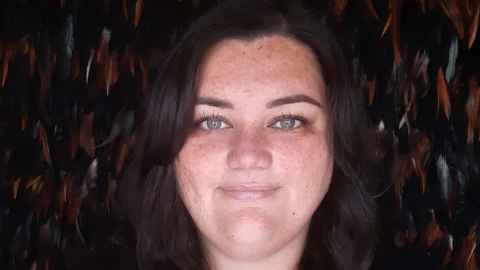Māori health researcher receives first grant
17 July 2023
A young wahine Māori doctoral candidate has secured a quarter of a million dollars for her latest research project, exploring fat bias.

Doctoral candidate Ashlea Gillon of Ngāti Awa, Ngāpuhi and Ngāiterangi whakapapa, has been awarded a Māori Health Emerging Researcher First Grant from the Health Research Council (HRC) of New Zealand, the government’s principal funder of health research.
Gillon has secured $249,815 for her project titled Mana Mōmona: Exploring Fat (Bias) within Health Spaces for Māori, which will look at fat bias within healthcare settings for Māori and how it contributes to, and is part of, a system of oppression that inhibits and restricts access to wellness and equitable healthcare.
Gillon will be working alongside two of her tuākana, Professor Melinda Webber (Education and Social Work) and Professor Terryann Clark (Medical and Health Sciences).
She says applying for a HRC grant was daunting at first, but with the support of friends and whānau, their that tautoko gave Gillon the confidence in giving the application process a go.
“I think it was around September last year when I saw the applications were open and I started to think about applying. In October I wrote the proposal and reached out to my tuākana, Professor Webber and Professor Clark, alongside Dr Meri Haami, Selah Hart and Hāpai Te Hauora to see if they would tautoko the research and they did,” Gillon explains.
“The application was quite in depth, I gathered reference letters and submitted it, HRC confirmed it was received and under review and then it was a waiting game.
"I was sent feedback that was followed by paperwork and a contract. The whole process took around six or seven months all up, I was excited and nervous the whole time. I still am.”
Ash’s work grounds understandings of body sovereignty in mātauranga-tuku-iho, referencing the curves and bounty of tūpuna wāhine like Hinemoana and Papatuānuku, and the inherent power in their form.
The project is an extension of her current PhD work that looks at the wāhine Māori experiences of fat bias. Now, her HRC project will open up insights into the experiences across all genders.
The two-year project will begin on 1 September 2023 and will ask questions such as what is fat bias and why it impacts Māori, also spotlighting what enhances Māori mana mōmona and mana tinana in the healthcare space.
Gillon is hoping the project will create positive changes in systems that are inherently biased and not built for Māori.
“I am just so excited to kōrero with fat Māori across the gender spectrum to get to know them and understand their experiences and I know that I am so well supported by Professors Webber and and Clark,” she says.
Professor Webber is no stranger to Ashlea’s work and explains how powerful it is.
“Ash’s work grounds understandings of body sovereignty in mātauranga-tuku-iho, referencing the curves and bounty of tūpuna wāhine like Hinemoana and Papatuānuku, and the inherent power in their form. Her work is generative and mana-ful; it is tirohanga Māori,” Webber says.
Ash’s research will seek solutions for how we do better as health professionals and how our health system can ensure that our momona whānau have their rights to quality care realised, with dignity and respect.
Professor Clark is keen to see the change that this work will bring about.
“Fat bias was something I was never taught about in my training, yet for many people the shaming and moralising about their bodies can mean they avoid care and are treated poorly if they do access care," Clark says.
"Ash’s research will seek solutions for how we do better as health professionals and how our health system can ensure that our momona whānau have their rights to quality care realised, with dignity and respect."
The research can be confronting for some people, but Gillon says this is one of the most impactful ways it works.
“My work makes people confront their own personal beliefs and biases. It highlights the different ways they may understand fat and bodies and it makes them uncomfortable because they start to uncover some tough truths.
"We must start thinking about healthcare in an intersectional way because if we don’t, then we are actively harming people whether we realise it or not. It's so important that when people feel uncomfortable about my work they unpack their feelings to understand themselves and their bias better.”
With a strong foundation and a powerful team, the research is set to be a game changer, and Gillon is looking forward to creating systemic change through her research.
Media queries
Emmaline Pickering-Martin | Media adviser, Pacific
E: emmaline.pickering-martin@auckland.ac.nz